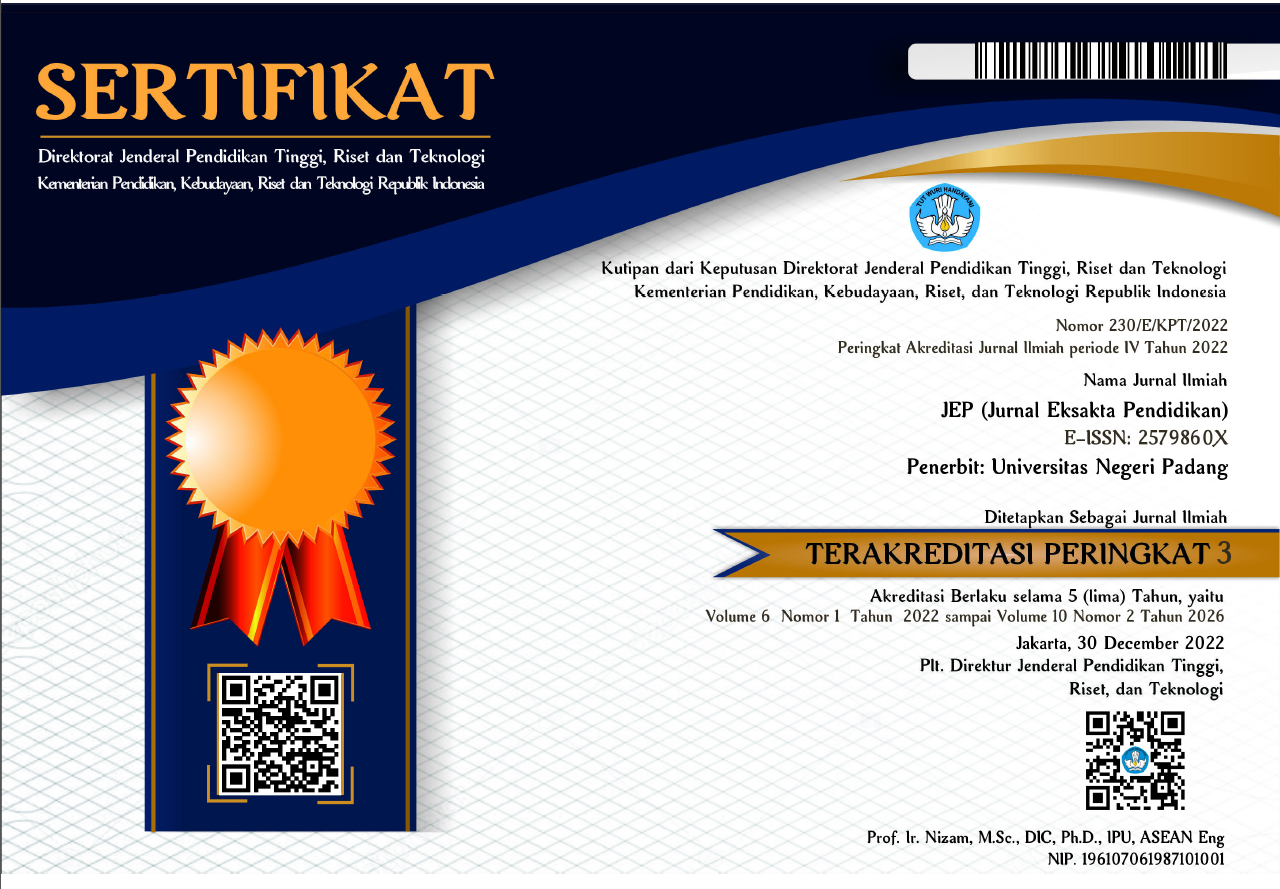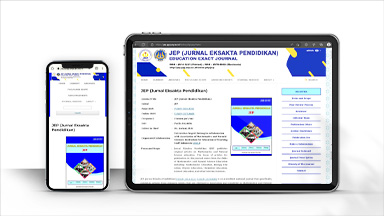Developing Students’ Book Characterized Realistic Mathematics Education (RME) to Improve Numeration Literacy Skill
Abstract
The purpose of this research was to develop a Student Book with Realistic Mathematics Education (RME) characteristics in terms of the results of validity, practicality, and effectiveness tests. The development of this student book uses the Plomp model that was carried out in three phases, namely: (1) Preliminary research, (2) Prototyping phase, and (3) Assessment phase. In the Preliminary research phase, it was found that the numeracy literacy skills at State Elementary School 2 Padenganploso were still low and the teaching materials used did not contain problems in everyday life that were relevant to the environmental conditions around students. In the Prototyping phase, student book development was carried out using steps that follow the principles and characteristics of RME. In the Assessment phase, based on the results of expert validation, an average score of 3.86 was obtained for all aspects, which means that the RME student book can be stated to be valid. From the observations of the implementation of the student book, a score of 3.87 is obtained, which means that the practical test by the observer meets the Practical criteria. From working on the numeracy literacy questions, it was found that 90% of students scored above 65, and the results of the N-Gain calculation as a whole obtained an average score of 0.71 with a high interpretation. The results of observations of student activity obtained an average of 3.8 with the active category, and the results of student responses obtained 90% gave a positive response, which means that the student book with RME characteristics meets the criteria of Effectiveness.
Downloads
References
Anita, Y., Thahir, A., Dwi Rahmawati, N., Matematika, P., Islam Negeri Raden Intan Lampung Jalan Letkol Endro Suratmin Sukarame, U., & Lampung, B. (2021). Mosharafa: Jurnal Pendidikan Matematika Buku Saku Digital Berbasis STEM: Pengembangan Media Pembelajaran terhadap Kemampuan Pemecahan Masalah. http://journal.institutpendidikan.ac.id/index.php/mosharafa
Baarisina, E. Ö., Ve, E., Yönelk, R., Görüler, Ö., Özdemr, E., & Üzel, D. (2011). Gerçekç matematk the effect of realistic mathematics education on student achievementand student opinions towards instruction. In Journal of Education) (Vol. 40). http://earged.meb.gov.tr/earged/Ol
Hake, R. R. (2007). Design-based research in physics education: a review*. http://www.physics.indiana.edu/~hake/DBR-Physics3.pdf
Herpratiwi. (2016). Teori Belajar dan Pembelajaran. In Media Akademi Yogyakarta. Media Akademi.
Hidayati, V. R., Pramestie Wulandari, N., Maulyda, M. A., Erfan, M., Nur, A., & Rosyidah, K. (2020). Literasi matematika calon guru sekolah dasar dalam menyelesaikan masalah pisa konten shape and space. Jurnal Pembelajaran Matematika Inovatif, 3(3). https://doi.org/10.22460/jpmi.v1i3
Istihapsari, V., Istiandaru, A., Wahyudi, R. S., Sukestiyarno, S., Suyitno, H., & Rochmad, R. (2023). Using Context of Local Environment Maps to Develop Lesson Plan which Foster Mathematical Literacy. International Journal on Emerging Mathematics Education, 7(1), 35. https://doi.org/10.12928/ijeme.v7i1.25764
Özkaya, A., & Yetim Karaca, S. (2017). The effects of Realistic Mathematics Education on students’ achievements and attitudes in fifth grades mathematics courses. In International Online Journal of Education and Teaching (IOJET) (Vol. 2017, Issue 2). http://iojet.org/index.php/IOJET/article/view/187/162
Parta, N. (2009). Pengembangan Model Pembelajaran Inkuiry untuk Penghalusan Pengatahuan Matematika bagi Mahasiswa Calon Guru.
Pratiwi, I. (2019). Efek program pisa terhadap kurikulum di indonesia. Jurnal Pendidikan Dan Kebudayaan, 4(1), 51–71. https://doi.org/10.24832/jpnk.v4i1.1157
Putri, R. I. I., & Zulkardi, Z. (2019). Designing Jumping Task on Percent using PMRI and Collaborative Learning. International Journal on Emerging Mathematics Education, 3(1), 105. https://doi.org/10.12928/ijeme.v3i1.12208
Retno Kusumawardani, D. (2018). Pentingnya Penalaran Matematika dalam Meningkatkan Kemampuan Literasi Matematika. https://journal.unnes.ac.id/sju/index.php/prisma/
Riyanto, W. D., & Gunarhadi, G. (2017). The Effectiveness of Interactive Multimedia in Mathematic Learning: Utilizing Power Points for Students with Learning Disability. IJPTE : International Journal of Pedagogy and Teacher Education, 1(1). https://doi.org/10.20961/ijpte.v1i1.8400
Sagala, P. N., & Widyastuti, E. (2022). Developing an Interactive E-Book on Statistics Based on a Realistic Mathematical Approach Assisted by The SIPDA Learning Management System. International Journal on Emerging Mathematics Education, 6(2), 131. https://doi.org/10.12928/ijeme.v6i2.21027
Sanjaya. (2011). Strategi Pembelajaran Berorientasi Standar Proses Pendidikan. Kencana Prenada Media.
Saraseila, F., Karjiyati, V., & Agusdianita, N. (2020). Pengaruh model realistic mathematics education terhadap kemampuan literasi matematika siswa kelas v sekolah dasar gugus xiv kota bengkulu. Jurnal Math-UMB.EDU, 7(2). https://doi.org/10.36085/math-umb.edu.v7i2.724
Shoimin, A. (2014). 68 Model Pembelajaran Inovatif dalam Kurikulum 2013. Ar-Ruzz Media.
Siswono. (2019). Paradigma Penelitian Pendidikan. PT Remaja Rosdakarya Offset.
Sukatin, S., Chofifah, N., Turiyana, T., Paradise, M. R., Azkia, M., & Ummah, S. N. (2020). Analisis Perkembangan Emosi Anak Usia Dini. Golden Age: Jurnal Ilmiah Tumbuh Kembang Anak Usia Dini, 5(2), 77–90. https://doi.org/10.14421/jga.2020.52-05
Taskiyah, A. N., & Malasari, P. N. (2022). Inovasi Buku Matematika Berpendekatan Realistic Mathematics Education Terintegrasi Nilai Keislaman pada Materi Bilangan. ARITHMETIC: Academic Journal of Math, 4(2), 139. https://doi.org/10.29240/ja.v4i2.5419
Uzel, D., & Uyangor, S. M. (2006). Attitudes of 7th class students toward mathematics in realistic mathematics education. International Mathematical Forum, 1951–1959. https://doi.org/10.12988/imf.2006.06172
Widjaja, Y., & Heck, A. (2003). How a Realistic Mathematics Education Approach and Microcomputer-Based Laboratory Worked in Lessons on Graphing at an Indonesian Juniour High School. Journal of High Energy Physics - J HIGH ENERGY PHYS, 26, 1–51.
Copyright (c) 2024 Khafidhoh Nurul Aini

This work is licensed under a Creative Commons Attribution 4.0 International License.

This work is licensed under a Creative Commons Attribution 4.0 International License.




_(2579-860X).png)
_(2614-1221)1.png)




